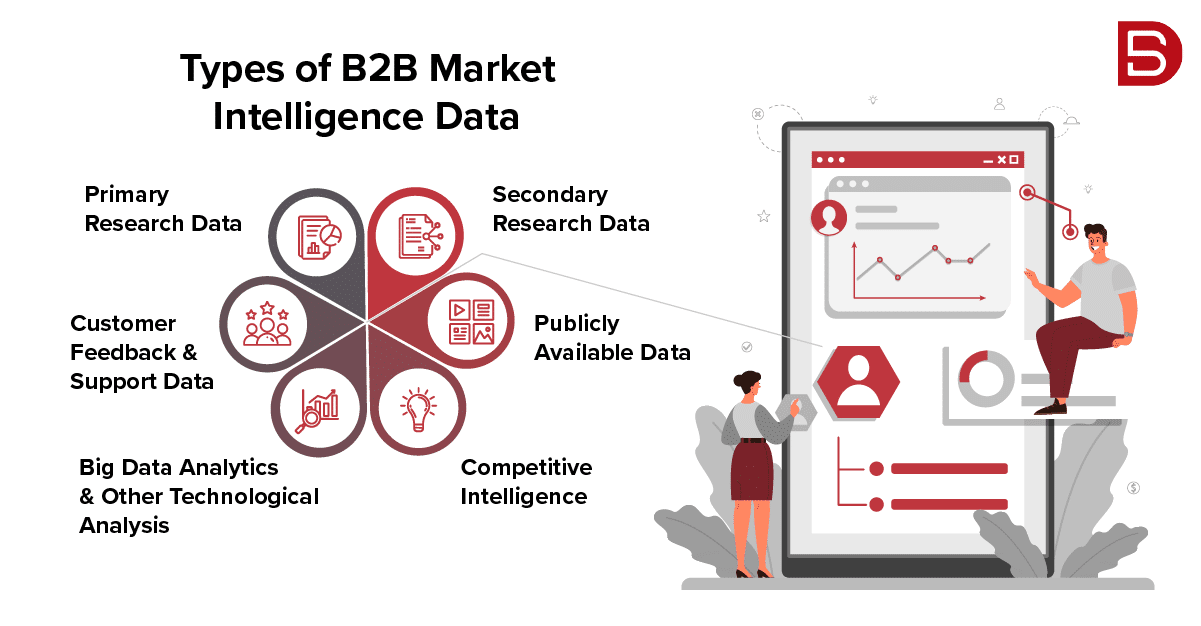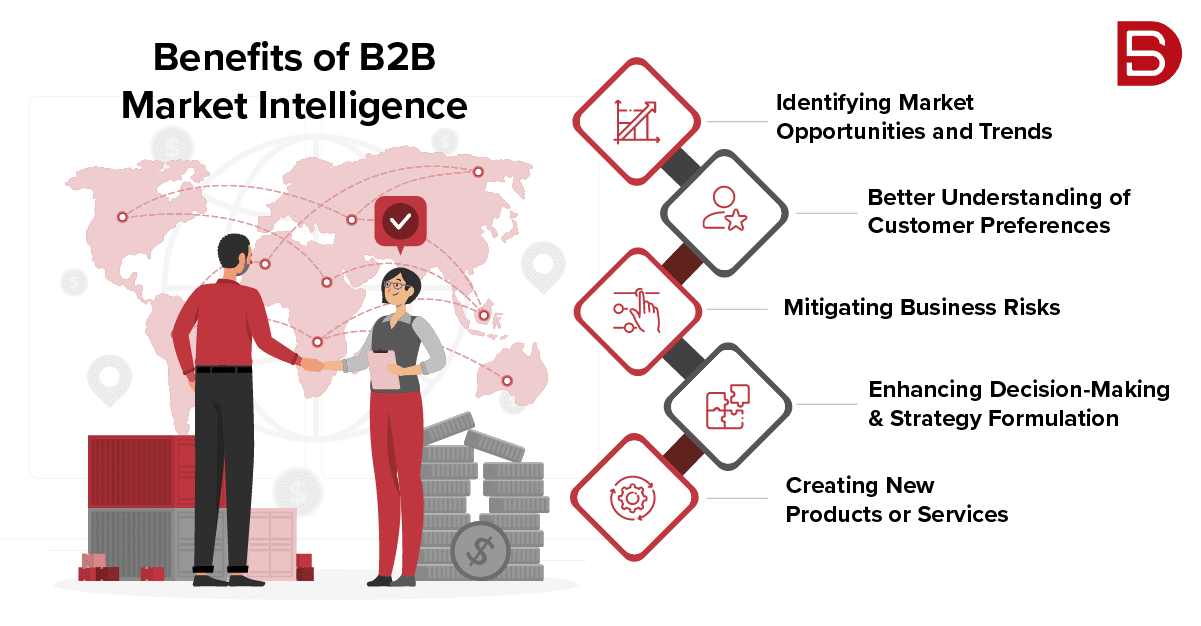Understanding B2B Market Intelligence
In the modern competitive business environment, understanding what your customers want and knowing your market can significantly benefit any business. It only allows them to tailor their products and services to suit a specific market but also influences their customers’ buying decisions by offering customized solutions.
This makes B2B Market Intelligence such a huge prominence for modern businesses. In its purest form, B2B Market Intelligence is a systematic approach for collecting, analyzing, and interpreting data about the business-to-business (B2B) marketplace.
Every modern business gathers valuable insights about customers, industry trends, competitors, and market opportunities; B2B Market Intelligence allows them to put all that data to use and formulate effective strategies. In doing so, they gain a better understanding of their customers and a significant competitive edge over their competitors.
In this blog, we take a deep dive into B2B marketing intelligence to understand some vital aspects of it. So let us get started.
Types of B2B Market Intelligence Data
B2B Market intelligence can be of different forms for different businesses. Here, we look at some of the most common and valuable B2B market intelligence data.
• Primary Research Data
Information gathered directly through surveys and interviews is classified as preliminary research data. These interviews or surveys can have B2B customers, suppliers, or industry stakeholders as participants. They can be designed to have a closer insight into the customers’ buying behavior, preferences, and pain points.
• Secondary Research Data
This data comes in the form of industry-specific reports, market analyses, and research studies, generally conducted by dedicated market research firms or, at times, by government authorities to gain a better understanding of the potential opportunities that there are and predict any emerging market trends.
• Publicly Available Data
Information gathered from published sources such as corporate websites, industry-specific publications, or even government databases fall under this category.
• Competitive Intelligence
Competitive intelligence comes through competitor analysis. It gives an understanding of your competitors’ strengths, weaknesses, activities, and strategies. This information benefits businesses looking to gain a competitive advantage over their competitors.
• Big Data Analytics and Other Technological Analysis
This information is gathered using web scraping, social media monitoring, or big data analytics websites, social media platforms, and online forums. This information helps understand customer sentiments, trends, or any correlation that can help a business make strategic decisions.
• Customer Feedback and Support Data
Customer support data is a wealth of information that businesses must leverage to understand customer pain points, faulty processes, and any potential areas of improvement for them.
While these are the primary form of B2B marketing intelligence data, there are several others that you can collect through industry events and associations, supplier data, and partner collaboration.
Benefits of B2B Market Intelligence
The benefits of B2B market intelligence primarily depend upon where and how you use the insights gathered from B2B market intelligence. However, certain benefits can be availed by any business deploying B2B market intelligence, irrespective of business or industry. So, let’s have a look at them.
• Identifying Market Opportunities and Trends
B2B Market Intelligence makes it easier for businesses to identify and capitalize on any emerging market trend or opportunity. You can also use data to identify any untapped opportunity for your business or create customized products or services based on customer feedback. This will give you a competitive advantage in your market entry strategy.
• Better Understanding of Customer Preferences
Analyzing customer data through market intelligence gives customers more profound insights into customer needs, preferences, and even pain points. It also allows you to create customized products or services or have special marketing strategies for higher customer satisfaction.
• Mitigating Business Risks
Insights from market intelligence aid in assessing any potential business risk or challenge in the market. Businesses can quickly identify a possible shift in customer preference, industry disruption, or any change governing regulations.
• Enhancing Decision-Making and Strategy Formulation
Access to reliable and relevant insights enables informed decision-making and strategy formulation for any business leveraging the information carefully.
• Creating New Products or Services
Market intelligence makes investing more accessible in developing new products or services, allowing you to validate your ideas through customer feedback or market research. The validation will enable you to allocate resources accordingly and have higher success potential.
Overall, B2B market intelligence offers a wide gamut of benefits to any business leveraging it to its maximum potential. From identifying market trends to opportunities to knowing customers better, B2 B market intelligence is a valuable resource for businesses looking to make informed decisions and convert them into success.
How to Make B2B Market Intelligence Work For You
For any business to have B2B market intelligence work for them, they need a systematic approach. Here we have listed steps that you can take to make B2B market intelligence work for you.
• Set Clear Objectives and Scope
You must set clear goals and scope for your B2B Market Intelligence efforts. You need to identify the information you need, the areas you want to focus on, and the scope of your market research. This guarantees that the information you gather focuses on your business objective.
• Get Multiple Data Sources
The information you gather must be a mix of both primary and secondary data sources to yield comprehensive insights. You can use customer surveys, interviews, and focus groups as the source of your preliminary research, while for the secondary source, you can use sources such as market reports, industry publications, or competitor analysis.
• Get The Right Technology and Data Analytics Tools
Analyzing vast amounts of market data will require advanced data analytics, so you need to ensure that you have the right technology and tools available. You must get tools that utilize artificial intelligence (AI) or machine learning algorithms for pattern detection, trend identification, or predicting trends.
• Integrate Market Intelligence into Your Decision-Making Processes
You need B2B market intelligence as an integral part of your business decision-making process. So, ensure that the data and insights you build as part of your market intelligence efforts are shared across the organization.
• Be Agile and Adaptable
The most important thing is to remain agile and adaptable, as the modern business landscape is highlighted as volatile and constantly evolving. You must continuously monitor market trends and customer preferences to stay ahead.
• Monitor Key Performance Indicators (KPIs)
To make B2b market intelligence work for you, you need to have measurable KPIs attached to it to track the effectiveness of your efforts. These KPIs will allow you to make informed decisions on any potential change or tweak your B2B market intelligence efforts need.
• Stay Compliant with Data Privacy Regulations
Working with any amount of data comes with massive responsibility towards data handling and management. Thus, you need to make sure that you always stay compliant with international and local data privacy and security regulations. You need to take all possible preventive measures you can to safeguard the sensitive information you have on your customers and competitors to protect the privacy of businesses and individuals that are part of your market intelligence gathering exercise.
If you diligently follow these steps, you can have an active and effective B2B marketing process set up in your organization and reap the many benefits that comes with it.
Conclusion
In this blog, we saw what B2B market intelligence, its benefits, the data sources you can leverage, the implementation strategies, and the types of B2B market intelligence you can implement in your organization is. We hope that it has helped you understand B2B Market Intelligence and how it can be a game-changer for your businesses. And if you are ready to embark on your journey to unleash the power of B2B market intelligence for your business, we can help you get started. Write to us at: marketing@datamaticsbpm.com, and we will have our market expert research reach out with a comprehensive solution for your business.
 Select an element to maximize. Press ESC to cancel.
Select an element to maximize. Press ESC to cancel.
Somnath Banerjee



